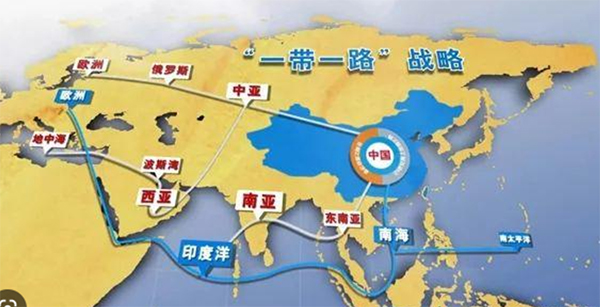On the night of September 7 through the early hours of September 8, a blood-red moon was visible across all of China. (Video screenshot)
[People News] Nationwide protests have erupted in Nepal, toppling the pro-CCP Communist government. Protesters climbed the flagpole at Communist Party headquarters, tore down the party flag, and burned the building. Khadga Prasad Oli, chairman of the Nepal Communist Party and prime minister—who had just returned from attending the military parade in Beijing—resigned and fled; his whereabouts are unknown. His residence was burned down. Parliament, the headquarters of Kantipur TV (considered the mouthpiece of the Communist Party), and the homes of several senior officials were also set ablaze. President Bhandari submitted her resignation as well, with discussions underway on selecting a new leader. A regime that once appeared strong collapsed overnight.
And all of this stemmed from a youth-led protest just a day earlier against government corruption and the blocking of social media.
Although Nepal is a relatively small country, it shares some striking similarities with the CCP: corruption, suppression of free speech, monopolisation of resources by elites who flaunt their wealth, high unemployment, poor economic conditions, and wide wealth gaps. This is why the CCP is deeply fearful of such events. Beijing has yet to respond.
That said, the CCP’s machinery of repression is far more sophisticated, ruthless, and efficient than Nepal’s. Jiang Zemin’s doctrine of “eliminating all instability in the bud” has proven effective for the regime, and the CCP has accumulated even more experience since. The Party monopolises control over all state institutions of violence, including the military. Its organisational hierarchy is extremely rigid. Moreover, decades of “glorious and infallible” propaganda have brainwashed many “little pinks” into willingly serving as slaves.
For these reasons, the CCP believes its citizens cannot stir up real waves of rebellion. Over thirty years ago, the collapse of the Soviet Union did not topple the CCP.
Still, the Party senses a looming catastrophe. History shows that every dictatorial and brutal regime is a paper tiger—strong on the outside, hollow within. Their downfall always comes unexpectedly, often in a matter of moments. The CCP is not blind to this reality. It knows that popular anger, its own crimes, and internal fragmentation will eventually converge into a tidal wave that sweeps away the regime.
Can it not be afraid? Of course, it is afraid.
The key difference now is that today’s international and domestic circumstances are not what they were thirty years ago. Around the globe, the CCP’s “old friends, good friends, and true friends” are dwindling. Syria, Cuba, Venezuela—which of them truly shares Beijing’s dream anymore?
A number of Iran’s military and political leaders were recently assassinated by Israel. On the 9th, four top Hamas leaders were reportedly killed in an Israeli airstrike on their political headquarters in Doha, Qatar. Meanwhile, U.S. President Trump issued a “final ultimatum” to Hamas, demanding it accept a hostage-release deal, calling it the “last warning.” Even the Taliban ended an oil extraction contract with a Chinese company this June. As for Xi Jinping’s so-called “no-limits partnership” with Putin, Moscow has not only pressured Beijing to back the war in Ukraine but also exploited the issue of organ transplantation to expose the CCP’s crimes globally—a stab in the back.
Today’s United States is nothing like it was under George H. W. Bush thirty years ago, when Washington pursued appeasement. A single trade war now is enough to leave Beijing gasping for air. The EU, East Asia, Southeast Asia, and South American nations are lining up against the CCP. Italy and Panama have both withdrawn from the Belt and Road Initiative. Mexico has announced new tariffs. Beyond border disputes with India and the Philippines, and a few African countries asking for money, what true friends does Beijing still have?
It is not only the international community that has turned against the CCP—heaven itself now seems intent on isolating the Party and holding it accountable for its crimes. Whoever flirts with Beijing will suffer misfortune.
On August 20, Chinese Foreign Minister Wang Yi visited Afghanistan. The Taliban’s foreign ministry revealed that Beijing hoped Afghanistan would join Xi Jinping’s flagship initiative, the “Silk Road Economic Belt,” and sought deeper cooperation across multiple areas. Yet on August 31, a 6.0-magnitude earthquake struck Afghanistan, and by September 4 the official death toll had reached 2,205, with 3,640 injured and 6,782 houses destroyed. Casualties were expected to rise further.
On July 23, 2025—the 26th anniversary of the CCP’s persecution of Falun Gong—a Moscow court sentenced Russian citizen Natalya Minenkova to four years in prison for practising Falun Gong. She had been arrested during Putin’s May 2024 visit to Beijing. Just a week later, on July 30, an 8.8-magnitude earthquake hit Russia’s Kamchatka Peninsula, triggering a tsunami that struck Japan, Hawaii, Taiwan, and even Shanghai on the Chinese mainland, along with other Pacific regions.
On April 15, the day before Xi Jinping visited Malaysia, local police suddenly violated the long-standing rule of “non-interference in assemblies” by arresting 76 Falun Gong practitioners who were studying Zhuan Falun together. Between August 24 and August 31, Malaysia—though not on the Pacific “Ring of Fire”—experienced seven earthquakes, ranging in magnitude from 2.9 to 4.1.
(To be continued)
(First published by People News) △











News magazine bootstrap themes!
I like this themes, fast loading and look profesional
Thank you Carlos!
You're welcome!
Please support me with give positive rating!
Yes Sure!